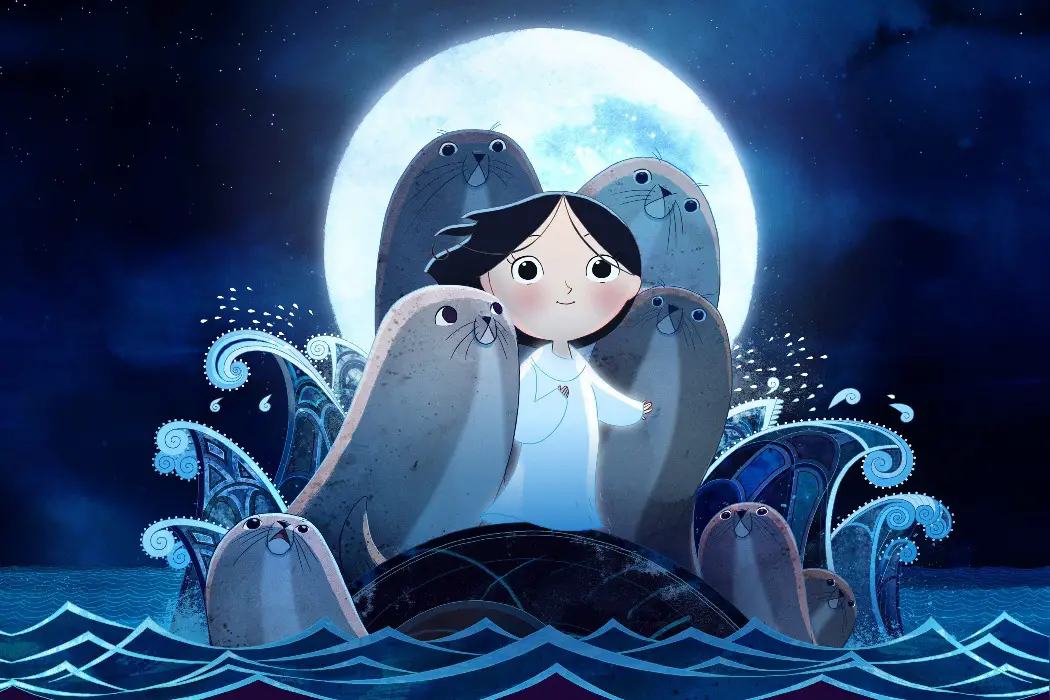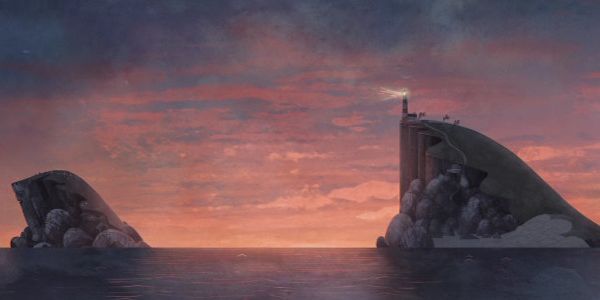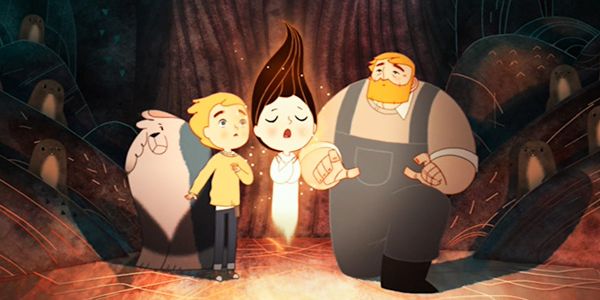SONG OF THE SEA: A Wave Of Emotion

Patrick Crossen is a writer currently living in Pittsburgh, PA…
In 2014, the Irish animation studio Cartoon Saloon released their animated feature Song of the Sea. It was well received by critics, and even received an Oscar nomination for Best Animated Feature, though it lost to Big Hero 6. I’ve often found that Disney’s animated films that make it to the Oscars are often fondly remembered, while other smaller studios are left to wither away into obscurity.
Because of this, I feel that it’s my mission to keep the animated films of yesteryear alive, even if they don’t come from the House of Mouse. Animated films, regardless of the studio from which they come, are valid mediums of storytelling, and Song of the Sea just might be one of the best out there.
Song of the Sea is a film that I often find myself thinking about; be it the haunting score or its beautiful mosaic-styled animation, it seems to always be lurking in the recesses of my brain. Lately however, I’ve found myself fascinated by the intricacies and poetry of its plot, and the themes that sprinkle their way through its hour and a half runtime. It’s a film of heart, lessons, and emotion. Let’s dive in.
The Players
Song of the Sea tells the story of a young boy named Ben, who must help his sister, Saoirse (who is mute), recover her selkie coat so that she can sing a song to help free the faire-folk, who are trapped by an ancient goddess named Macha.
Now that might sound like a lot, especially if you’re not well-versed in Irish folklore. But Song of the Sea is sure to build your relationship with this mythic culture from the ground up. We learn that a selkie is a human that can transform into a seal, and Macha is the witch-goddess that steals emotions from the faire-folk, who are essentially those who live in the magical world.
The film opens with Ben helping his mother and father prepare a nursery for his sister who has yet to be born. The family lives in a lighthouse in the middle of the sea and seems to be the picture of happiness. Through disorienting of slices of life, we see that Ben’s mother must leave (and return to the sea, because she too is a Selkie), leaving Ben’s father (Brendan Gleeson) to raise his children alone in the lighthouse by the sea.
The Land of Fairies
Part of the brilliance of Song of the Sea is how fantastical (and I use that word literally, its invocation of fantasy) it is right out of the gates. The romantic image of a lone lighthouse out at sea makes the viewer feel as though we’re sitting down to a children’s story. But we’re not sitting down to a children’s story: we’re sitting down to a fairytale.
Fairytales are an educational branch of storytelling. Little Red Riding Hood warns of the dangers of speaking to strangers, and The Ugly Duckling teaches us to consider that our differences do not make us unappealing. By dropping us in this fairytale setting with a lighthouse out at sea, Song of the Sea prepares us for the lessons we will be taught.

Song of the Sea is happy to lean into its fairytale genre. Like the “Once upon a time,” that often begins the fairytales we love, Song of the Sea begins its story with a plea. “Come away, oh human child, to the waters and the wild with a fairy, hand in hand, for the world is more full of weeping than you can understand.”
This opening monologue is whispered by Ben’s mother (voiced by singer Lisa Hannigan) and extends a welcoming hand. We are invited to enter the land of the fairy. But while Song of the Sea clearly loves the fairies, the film maintains that the fairy world must be used as an escape, not a home.
It’s not unlike the Greek myth of Persephone, who was trapped in the underworld with Hades after eating a fruit that he gave the goddess. Persephone’s mother, Demeter, made a bargain with Hades so that her daughter would be allowed to stay in the human world for half of the year, and spend the other half in the underworld.
Emotional Repression
The separation of the fairy world from ours, and the film’s plea to go but not stay, begins to make more sense when we examine the most prevalent theme in the film: the dangers of repression.
Repression laces itself throughout the movie in its characters. The father sits despondent from his children, trapped within his own mind as he mourns his wife after all these years. Saoirse, with her inability to speak, has her communication repressed.
When we get shots of the father, he is often staring longingly out at the sea, or looking at relics that his wife left behind. He is, in a sense, trapped in her world, thinking of the fairies and magic that forced her to leave.

Saoirse’s voice is tied to her magic coat, which helps all selkies use their magic. The fairy world seems to be the cause of her repression as well. Once she is given her coat, she will be free.
Saoirse must reclaim her coat so that she can speak again. She must travel to the fairies so that she can better exist with the humans. The father must let go of the mother. He must release the fairy world so that he can continue living in the human world.
Above all, Song of the Sea is a film about the repression of emotions. The villain of the story, Macha, steals the emotions of fairies and humans in an attempt to make the world a better place. She believes that her acts are done of mercy. The emotions are kept in jars in her house, where only the Selkie Song can free them.
The Hero
Song of the Sea wants the viewer to express their emotions. To allow them to pass through them like the sea, ebbing and flowing in a natural order. But for this to happen, someone must free their emotions. Someone must demonstrate to the father and Saoirse how to travel to the fairyworld and back. And Song of the Sea gifts us with our protagonist, Ben.
When I first watched this film, I found Ben underwhelming. He wasn’t Saoirse, the little girl who had the power to turn into a seal. Nor was he the father, a giant of a man, processing the death of his wife. Ben was, to my frustration, too normal.
But I think that’s what Ben brings to the film. He’s emotional. He’s bothered by his sister, pouts when he doesn’t get his way and cries when his father yells at him. Ben is a raw and unfiltered child who is not bothered by repression. His emotions want to be heard.
Macha even says, when she has Saoirse trapped and her emotions drained, “Just as a child should be, without troubles, without worry.” This is how Macha, our villain, believes a child should be. But Ben represents what we know children should be. Impatient, scared and curious.
Even the clothes that he wears makes Ben a run-of-the-mill child. He often sports a superhero cape. Not because it’s a normal piece of clothing, but because he likes it. Because it makes him brave. He also wears 3D glasses throughout the film, the two colors representing his ability to see the two worlds.

Song of the Sea wants children to know that it’s okay to be children. Rather than teach them lessons that will help them in adulthood, it teaches them skills that will help them now. It allows them to be children, unapologetically.
Our emotions are our humanity. When we repress them, we are trapped within ourselves, trapped in a fairyland that is foreign to us. Song of the Sea simply wants us to embrace what it is to be human.
Am I reading too much into this cartoon? Sound off in the comments below!
https://www.dailymotion.com/video/x54vrxu
Does content like this matter to you?
Become a Member and support film journalism. Unlock access to all of Film Inquiry`s great articles. Join a community of like-minded readers who are passionate about cinema - get access to our private members Network, give back to independent filmmakers, and more.
Patrick Crossen is a writer currently living in Pittsburgh, PA with a B.A. in creative writing. When he's not frantically checking his mailbox for his Hogwarts letter, he's probably at the movies. Patrick is currently working on his first fantasy novel. If his eyes are glazed over, it's because you haven't mentioned enough Guillermo Del Toro movies while talking to him.













